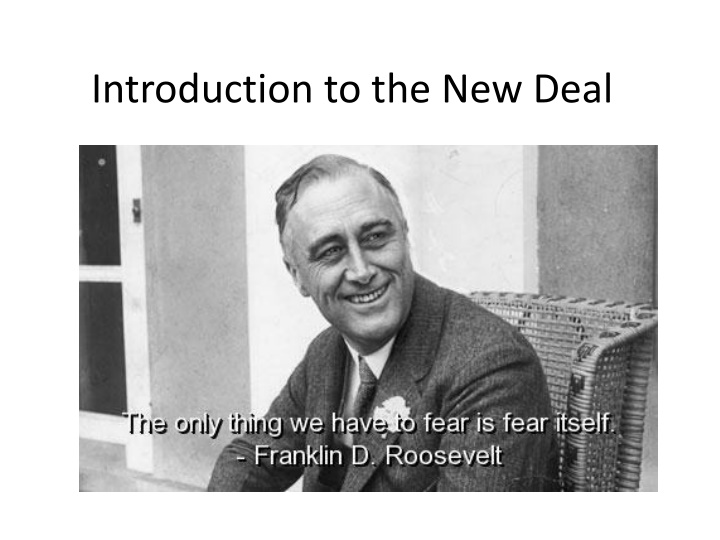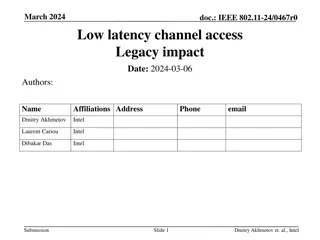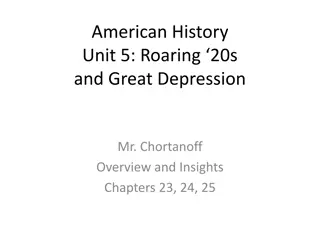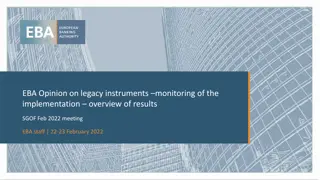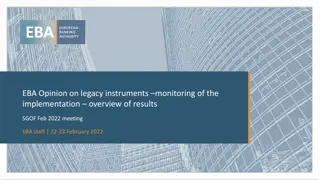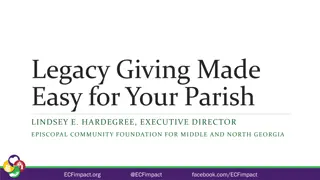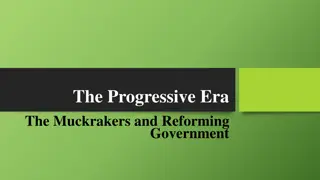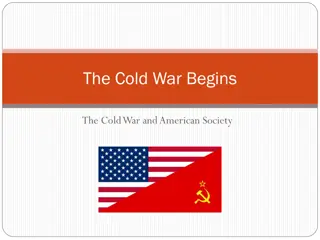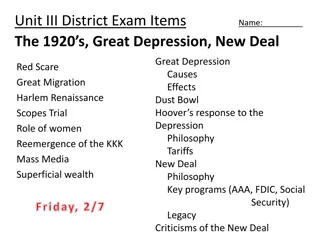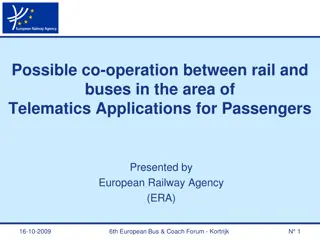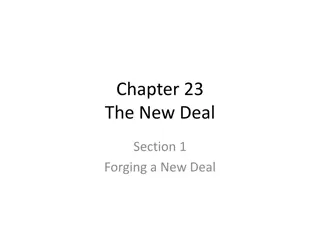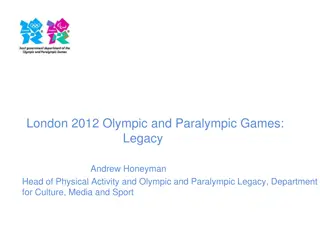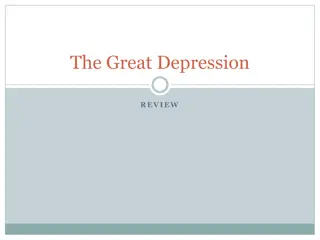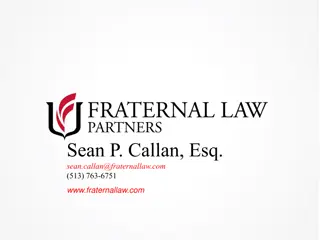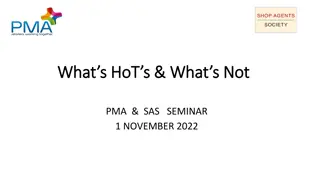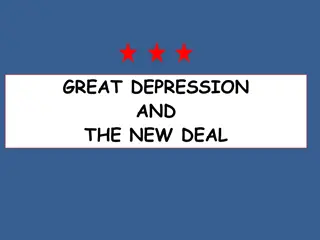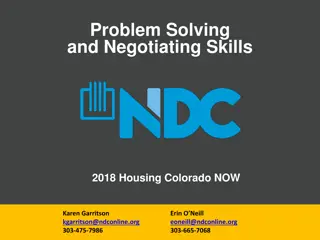Uncovering the Impact and Legacy of the New Deal Era
Explore the history of the New Deal, Franklin D. Roosevelt's transformative initiatives during the Great Depression, and the lasting effects of these policies on American society. Delve into the critical aspects of the New Deal such as banking reforms, work programs, and FDR's leadership style. Understand the significance of the New Deal in shaping modern government practices and its role in averting potential social upheaval during a tumultuous period in history.
Download Presentation

Please find below an Image/Link to download the presentation.
The content on the website is provided AS IS for your information and personal use only. It may not be sold, licensed, or shared on other websites without obtaining consent from the author.If you encounter any issues during the download, it is possible that the publisher has removed the file from their server.
You are allowed to download the files provided on this website for personal or commercial use, subject to the condition that they are used lawfully. All files are the property of their respective owners.
The content on the website is provided AS IS for your information and personal use only. It may not be sold, licensed, or shared on other websites without obtaining consent from the author.
E N D
Presentation Transcript
What We Will Learn What was the New Deal? What did Franklin Delano Roosevelt do during the Hundred Days? Why were Roosevelt s fireside chats significant?
What you will be able to do Explain what is the New Deal Summarize the initial steps Roosevelt took to reform banking and finance Describe New Deal work programs Identify critics of FDR s New Deal
Review of What Went Before Early 1900s Progressive Era Teddy Roosevelt Time of Reforms Roaring 20s New Ideas, good economic times Early 1930s The Great Depression
Election of Roosevelt Franklin Delano Roosevelt elected in 1932 Ran against Herbert Hoover Hoover was unpopular because of Depression Landslide: Roosevelt, 23 million votes; Hoover, 13 million votes
What is the New Deal? Roosevelt elected in 1932, but did not take office until 1933 During the time between election and taking office, FDR Carefully picked advisors professors, lawyers, journalists Came to be called the Brain Trust Developed set of policies to help problems of the Great Depression.
New Deal (def) - The set of policies developed by Franklin Roosevlt to help problems of the Great Depression.
FDR was related to Theodore Roosevelt New Deal echoed his Square Deal Theodore Roosevelt
Why should we care about the New Deal? Some say that that country was in such a bad state, that if not for the New Deal reforms there might have been a revolution or even a fascist take-over, as was occurring in Europe that led to World War II. The New Deal helped put many back to work, improving the economy and giving people hope. Set the ground work for how government works today: Increased government control.
Some programs still exist and are important to us! Federal Deposit Insurance Corp (FDIC) - Protects your money in the bank. Securities and Exchange Commission (SEC) Helps keep corporations from committing fraud. National Labor Relations Board (NLRB) Protects workers rights. Social Security Expanded electricity to rural areas Developed policies to help farmers Paved the way for conservation programs
FDR created New Deal, but Eleanor, his wife, also influential Franklin and Eleanor Roosevelt Some first ladies (wives of presidents) historically stay in the background. Eleanor, however, was influential in her own way and powerfully influence history.
They came from rich families, but their backgrounds gave them empathy with those less well-off Franklin Roosevelt Eleanor Roosevelt Born into wealthy family in New York state State senator, secretary of Navy, governor of New York Got polio in 1921, paralyzed from waist down Because of his disability, had greater compassion for people Interested in progressive causes Interested in child welfare, housing reform, equal rights for women and civil rights Active speaker, writer, popular in her own right Helped influence FDR s progressive policies
The Hundred Days Definition The first 100 days of FDRs presidency in which he pushed numerous programs through Congress 15 major pieces of New Deal legislation approved by Congress Expanded government s role in the economy Opposite of Hoover who believed in limited role of government
Banking & Finance Reform First thing Roosevelt did One reason for Depression was unregulated banking practices FDR s first step was to declare a banking holiday Banking holiday (def) Closed all banks for a brief period of time To prevent further withdrawals and panic Banks inspected to determine if solvent could stay in business Only those healthy could stay in business Restored public confidence in banks
Fireside Chats FDR went on radio to discuss his reforms to the public. Also helped public confidence.
FDRs Fireside Chat http://www.americanrhetoric.com/mp3clips/politicalspeeches/fdrfirstfir esidechat63496436943.mp3
Civilian Conservation Corps (CCC) Put young men 18 25 building roads, parks , etc
National Recovery Act (NRA) Established code of fair practice To stop trend of wage cuts, fall prices, and layoffs
National Recovery Association (NRA) Established code of fair practice To stop trend of wage cuts, fall prices, and layoffs Federal Housing Administration (FHA) Furnish loans for houses Federal Emergency Relief Association (FERA) Provided direct relief for the needy
Reasons Why Some Opposed 1. Roosevelt used deficit spending spending more money than it received in taxes Some opposed to this 2. Some liberals believed that FDR hadn t done enough to help the poor and reform economic system 3. Some conservatives believed that this gave government too much power and would lead to socialism (government control of economy)
Examples of Opposition Charles Coughlin, Catholic priest, used radio to deliver messages Huey Long, U.S. senator from Louisana, wanted to become president Proposed his own welfare program Promised something for everyone
Court Packing Bill Definition - FDR asked Congress to approve appointing 6 new justices Reason why In 1933 Supreme Court struck down NIRA as unconstitutional in 1933. Fear that New Deal would be dismantled. Bill was controversial and not approved by Congress In 1937, elderly justice retired and Hugo Black , supporter of FDR s policies appointed Court started ruling in favor of New Deal programs
Results of First New Deal Programs started during first 100 Days were helping, but gains not as great as he expected Unemployment remained high Production still less than 1920s The New Deal still was popular, so had public support Helped by Eleanor Roosevelt who travelled the country in support
The Second New Deal FDR s efforts continue
Also National Recovery Association (NRA) Established code of fair practice To stop trend of wage cuts, fall prices, and layoffs Federal Housing Administration (FHA) Furnish loans for houses Federal Emergency Relief Association (FERA) Provided direct relief for the needy
The Second New Deal the Second Hundred Days Additional programs developed Farmers Relief Labor Social Security Utilities
Help for Farmers Soil Conservation and Domestic Allottment Act Paid farmers for cutting production of soil- depleting crops Awarded farmers for good soil conservation methods Provided small loans for sharecroppers to buy land
Additional Relief Works Progress Administration (WPA) Helped youth, professionals, and other workers Spent $11 billion to put 8 million people to work Created 850 airports, 651,000 miles of roads and streets, 125,000 public buildings, and women made 300 million garments for the needy
Labor Wagner Act in 1935 Established collective bargaining Prohibited unfair firings of union members or organizing unions Fair Labor Standards Act in 1938 Maximum working hours to 44 hours per week Set minimum wage (25 cents per hour) Limited workers under 16
Social Security Passed in 1935 Aid to those over 65 Half came from workers and half from employees Some other benefits
Utilities Expanded electricity throughout country In 1935, only 12.6 percent of farms had electricity By 1949 was 90 percent Also regulated electrical utilities Tennessee Valley Authority (TVA)
